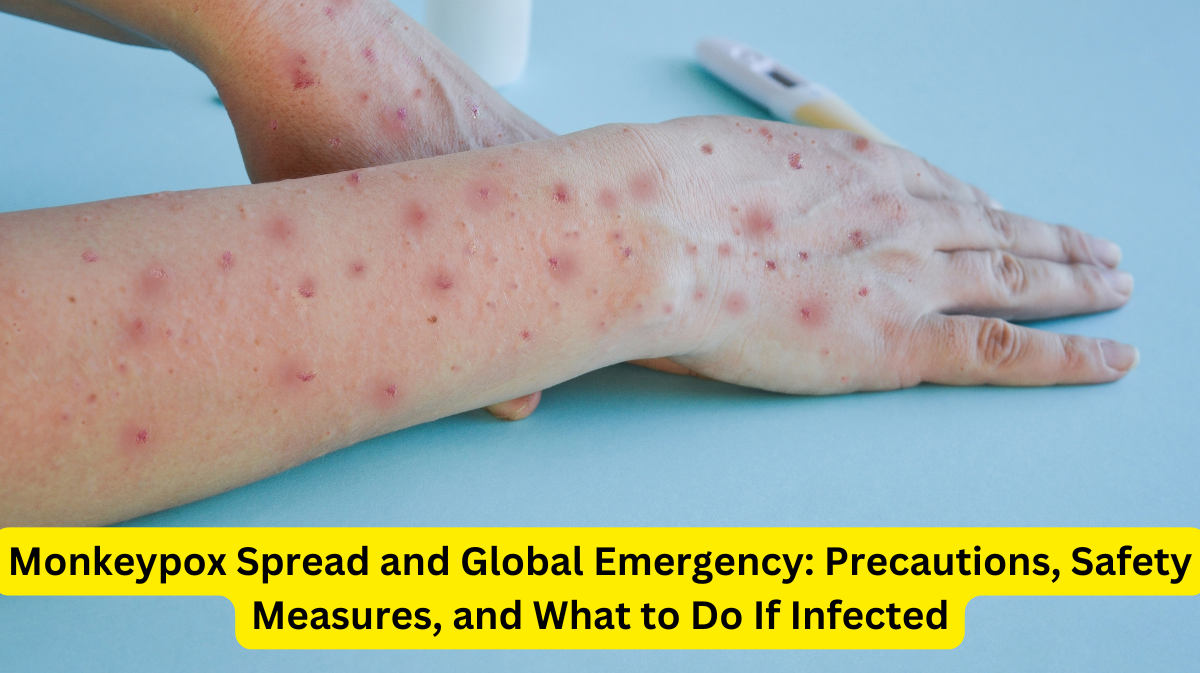Monkeypox Spread and Global Emergency: Precautions, Safety Measures, and What to Do If Infected

Learn about the spread of monkeypox, why it was declared a global emergency, and essential precautions and safety measures to protect yourself and others.
Introduction
In recent years, the world has faced numerous health crises, and the emergence of monkeypox is the latest to cause concern. As the virus continues to spread across various countries, it has been declared a global emergency by the World Health Organization (WHO). With its rapid transmission and the potential for severe health outcomes, understanding monkeypox, its spread, and how to protect yourself is crucial. In this article, we’ll explore the spread of monkeypox, why it was declared a global emergency, and the precautions and safety measures you can take to reduce your risk. We’ll also discuss what to do if you suspect you’re infected.
Understanding Monkeypox and Its Spread
Monkeypox is a viral zoonotic disease, meaning it can be transmitted from animals to humans. It is caused by the monkeypox virus, which belongs to the same family as the virus that causes smallpox. Although monkeypox is generally less severe than smallpox, it can still lead to significant health issues, especially in vulnerable populations.
How Does Monkeypox Spread? Monkeypox primarily spreads through close contact with an infected person, animal, or contaminated materials. Here are the main ways it spreads:
- Direct Contact: Touching the skin lesions, body fluids, or respiratory droplets of an infected person.
- Indirect Contact: Handling contaminated items such as bedding, clothing, or other materials that have come into contact with the virus.
- Animal-to-Human Transmission: Being bitten or scratched by an infected animal, or consuming undercooked meat from an infected animal.
The virus can enter the body through broken skin, the respiratory tract, or mucous membranes (eyes, nose, or mouth). Once infected, symptoms typically appear within 6 to 13 days, although the incubation period can range from 5 to 21 days.
Why Monkeypox Was Declared a Global Emergency
In July 2022, the WHO declared monkeypox a Public Health Emergency of International Concern (PHEIC). This designation was made due to the virus’s rapid spread across multiple countries, particularly in regions where monkeypox is not typically found. The global emergency status is a call for coordinated international action to contain the outbreak and prevent further transmission.
The declaration emphasizes the need for increased surveillance, research, and public awareness. It also highlights the importance of equitable access to vaccines, treatments, and other resources, especially in low- and middle-income countries where healthcare systems may be strained.
Precautions and Safety Measures
To protect yourself and others from monkeypox, it’s essential to take the following precautions and safety measures:
- Practice Good Hygiene:
- Wash your hands frequently with soap and water, especially after contact with sick individuals, animals, or potentially contaminated materials.
- Use alcohol-based hand sanitizers when soap and water are unavailable.
- Avoid Close Contact:
- Refrain from close physical contact with anyone who has symptoms of monkeypox, such as rashes, lesions, or fever.
- Avoid sharing personal items like towels, bedding, or clothing with infected individuals.
- Use Protective Gear:
- Healthcare workers and caregivers should wear gloves, masks, and protective clothing when caring for infected patients.
- If you suspect exposure to the virus, wear a mask and avoid touching your face.
- Be Cautious Around Animals:
- Avoid contact with wild animals, especially those that may carry the monkeypox virus.
- Cook all animal products thoroughly before consumption.
- Vaccination:
- Vaccines developed for smallpox are effective against monkeypox. Consult your healthcare provider about vaccination, especially if you are at higher risk.
What to Do If You’re Infected
If you suspect you’ve been infected with monkeypox, it’s crucial to take immediate action to prevent further spread and manage your symptoms:
- Isolate Yourself:
- Stay at home and avoid close contact with others, including household members, until you are fully recovered.
- Use a separate bathroom, if possible, and avoid sharing personal items.
- Seek Medical Attention:
- Contact your healthcare provider for advice and treatment options. Early diagnosis and supportive care are key to managing symptoms and preventing complications.
- Follow your doctor’s recommendations regarding antiviral treatments, which may help reduce the severity of the disease.
- Monitor Symptoms:
- Common symptoms of monkeypox include fever, headache, muscle aches, back pain, swollen lymph nodes, chills, and exhaustion. A rash often develops, starting on the face and spreading to other parts of the body.
- Keep track of your symptoms and seek medical attention if they worsen.
- Inform Close Contacts:
- Notify anyone you’ve had close contact with so they can monitor their health and take precautions.
Conclusion
The global spread of monkeypox and its declaration as a public health emergency serve as a stark reminder of the importance of vigilance and preparedness. By understanding how monkeypox spreads, taking appropriate precautions, and knowing what to do if infected, you can protect yourself and help curb the spread of this virus. Stay informed, stay safe, and prioritize your health and the well-being of those around you. Also read : CBD and CBG Gummies: A Complete Guide to Benefits, Differences, and How to Choose the Right One.




